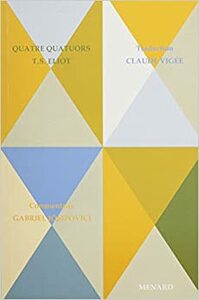Take a photo of a barcode or cover
And for having tried to read and understand the four quartets I have been changed… that is, my feelings about T.S. Eliot have not (but when I think about the musical Cats I feel a little bit better about him I guess … knowing how he would have hated it) the Four Quartets was dive into a man spiraling over his estranged partner, the war and what it has done to the English country side, and ofcourse religion. Each quartet has an elemental grounding to it whether it be fire or pools of haunted water with abandoned buildings the quartet is a symbol for a door into the subconscious and also a purification into the next line of thought. These poems are so meta and confusing but ultimately relatable the way a person goes through stages of acceptance when they’re analyzing things too hard. The first three quartets, Burnt Norton, East Coker, and The Dry Salvages, have a harsh linguistic feel to it in that Eliot is disheartened looking for solutions or little answers that God is out there. The fourth, Little Gidding, however, has a much happier fulfilled sound. The middle felt the most relatable and reminded me of how when you’re young you feel like you know it all and then one day you’re more adult than you’ve ever been and feel like you know nothing at all. I can sift through to get to the vision and sonorously I like the antithesis and repetition.
challenging
hopeful
reflective
fast-paced
hopeful
inspiring
reflective
fast-paced
I'm afraid I don't know how else to review this work if not in comparison to The Waste Land.
Very well-structured and approachable. I think it's because it reflects Eliot's later thinking, where he had settled into more mature, reflective themes like time, spirituality, and redemption. Profound themes, yes, but so eloquently done and not pretentious, which is important for me when it comes to poetry. The language is more meditative and contemplative, with less reliance on the kind of allusive density and fragmentation that makes The Waste Land feel so impenetrable (and frustrating!!) at times. It's less about presenting a shattered world and more about finding order and meaning.
I read sometime in The New Yorker that Eliot was once quoted saying to an interviewer: “In ‘The Waste Land,’ I wasn’t even bothering whether I understood what I was saying.” His own contradiction of not fully understanding his masterpiece, but in fact embracing Four Quartets as his finest work, is an example of how even great artists evolve in how they relate to their creations, that they are not immune to doubt or the shifting tides of time, taste, and personal growth. I find this quite moving.
Very well-structured and approachable. I think it's because it reflects Eliot's later thinking, where he had settled into more mature, reflective themes like time, spirituality, and redemption. Profound themes, yes, but so eloquently done and not pretentious, which is important for me when it comes to poetry. The language is more meditative and contemplative, with less reliance on the kind of allusive density and fragmentation that makes The Waste Land feel so impenetrable (and frustrating!!) at times. It's less about presenting a shattered world and more about finding order and meaning.
I read sometime in The New Yorker that Eliot was once quoted saying to an interviewer: “In ‘The Waste Land,’ I wasn’t even bothering whether I understood what I was saying.” His own contradiction of not fully understanding his masterpiece, but in fact embracing Four Quartets as his finest work, is an example of how even great artists evolve in how they relate to their creations, that they are not immune to doubt or the shifting tides of time, taste, and personal growth. I find this quite moving.
challenging
inspiring
mysterious
reflective
relaxing
medium-paced
I am not much of a poetry person, but I do enjoy some of it. I feel like this is exactly the kind of poetry people mean when they say they dislike it. There are lots and lots of words but it's like you're looking through a foggy window and can't quite make out half of what the author is saying. I think there are interesting ideas in here but the format is so pretentious that it completely obscures any real understanding. Obviously some people disagree since T. S. Eliot is a Nobel Laureate poet and this considered by many to be his best work.
Personally, I feel like I just read a whole bunch of words but I can barely tell you what the ideas were.
Personally, I feel like I just read a whole bunch of words but I can barely tell you what the ideas were.
When he said
So here I am, in the middle way, having had twenty years—
Twenty years largely wasted, the years of l'entre deux guerres
Trying to learn to use words, and every attempt
Is a wholly new start, and a different kind of failure
Because one has only learnt to get the better of words
For the thing one no longer has to say, or the way in which
One is no longer disposed to say it. And so each venture
Is a new beginning, a raid on the inarticulate
With shabby equipment always deteriorating
In the general mess of imprecision of feeling,
Undisciplined squads of emotion. And what there is to conquer
By strength and submission, has already been discovered
Once or twice, or several times, by men whom one cannot hope
To emulate—but there is no competition—
There is only the fight to recover what has been lost
And found and lost again and again: and now, under conditions
That seem unpropitious. But perhaps neither gain nor loss.
For us, there is only the trying. The rest is not our business.
I felt that.
challenging
dark
fast-paced
challenging
dark
emotional
reflective
tense
fast-paced





